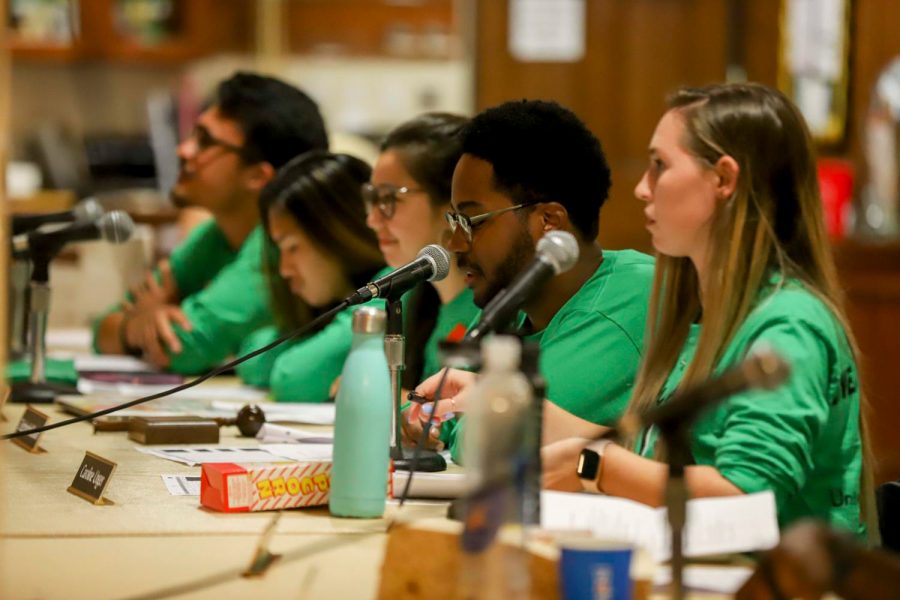Student leaders hopeful about raising future student wages
Kaycee Orwig | Senior Staff Photographer
The Student Government Board currently supports enacting a $15 minimum wage for student workers.
March 24, 2020
It may be Anaïs Peterson’s last semester on SGB, but they’re not letting it go to waste. Their referendum question appeared on the SGB election ballot on Feb. 25.
The question asked students if they believed Pitt should raise the minimum wage for student workers to $15 per hour. With record-breaking SGB election turnout, more than 4,200 students voted.More than 86% of those 4, 200 were in favor of a higher minimum wage for student workers.
Peterson, a senior majoring in English writing and urban studies as well as executive vice president of SGB, wanted to hear from the student body on an issue that affects many of them. Last year, the SGB election ballot included a referendum on fossil fuel divestment — a topic that faced increased exposure this year due to student protests on campus.
“They’re one of the few opportunities students have to voice their opinions directly on issues,” Peterson said.
Although the referendum doesn’t put the $15 minimum wage into place, it shows University officials what students would like to happen and the need for action.
“Looking back on precedent, it allows SGB to take a position and say we have overwhelming student support,” Peterson said.
Peterson said SGB will continue to work on this issue into the next school year.
“I think this will go beyond this year. I know that this is an issue next year’s board is also really concerned about and this isn’t really something that’s been limited to one SGB,” Peterson said.
Zechariah Brown, president of SGB, said any board member can suggest a referendum question. SGB members then vote on the question and if passed, the chair of the Election Committee adds it to the ballot.
With overwhelming support behind the referendum, Brown said the shift to online classes will not stop SGB from continuing to work towards a $15 minimum wage for all student workers.
“So the next steps will be to begin meeting (virtually) with administrators to discuss the process,” Brown said in an email. “Once we gather information we can choose to write a proposal, explaining the issue, possible solutions and what implementing these solutions would look like.”
Peterson said the COVID-19 pandemic highlights the need for a higher minimum wage for student workers as well as all Pitt employees.
“I think everything around the University’s financial situation is going to be under a lot more scrutiny and people are going to be paying a lot more attention to it, especially after everything that’s been happening with coronavirus,” Peterson said.
Eric Macadangdang, the president-elect of SGB for next year, said the board is continuing to work with University officials to advocate for the student body, despite the pandemic.
“Obviously a lot of stuff has been temporarily up-ended because of this whole pandemic,” Macadangdang said. “But prior to us leaving, the board had a meeting with senior leadership in which we discussed affordability. Specifically, we touched on student wages and we brought up the recent referendum.
According to Macadangdang, much of the groundwork of the movement for $15 for student workers was laid by Pitt’s chapter of United Students Against Sweatshops, a student labor organization dedicated to workers rights and social justice.
“They’ve really been at the forefront of continuing this conversation— increasing wages for student workers and making sure they’re protected and compensated fairly,” Macadangdang said.
USAS board member Isabel Holzman, a junior history and sociology major, said the organization has been campaigning to raise the minimum wage for students for years. The group did a presentation in the fall of 2018 for SGB and spoke with them about sending out a letter to the student body to gauge student support for a $15 minimum wage.
“We’ve been having discussions with SGB for the past two years. When the election came up, the opportunity presented to get the referendum and Anaïs proposed it. So it was a really quick turnaround time,” Holzman said.
Holzman said in the past when USAS has met with University officials, they have been asked whether or not there was significant student support for their movement.
“This did all the work of a petition in a really quick time and it was really accessible to the students. So I think it was a really good way to show that this is something students care about on campus,” Holzman said.
Prior to the referendum, USAS talked to student workers to see how they felt about their working conditions.
“Earlier last semester, we had collected some testimonies about student workers and overwhelmingly, students talked about their workload compared to how much they were getting paid,” Holzman said.
With the Pitt coursework and correspondence going online until the end of the semester, USAS’s first concern was about student workers going unpaid. Once they realized they would continue to be paid, USAS continued to move ahead.
“It is hard to make plans, and obviously we can only meet virtually. But what this does demonstrate is that people need good job security at Pitt. They need to be making enough wages so that they can save money if they need to,” Holzman said.
Holzman said USAS plans to continue to work with SGB in the upcoming school year.
“Hopefully in the new semester we will be able to use this opportunity with the new board to get some good stuff done,” Holzman said.








